When you’re first starting out, all the necessary supplies you need for making cold process soap can feel overwhelming. What items do you absolutely need from that recipe? What items are optional? Here are all the soap making supplies I use for my soaps and when I use them.
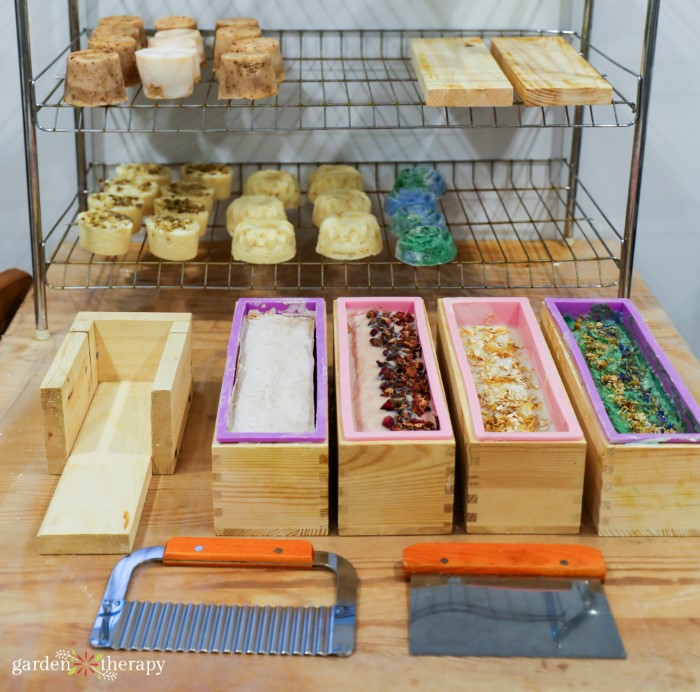
Many years ago, I took a soap making course. I didn’t realize at the time just how much I would love it. Since then, it’s turned into one of my favourite pastimes. I love testing out new soap recipes and sharing all of my successes with you.
With soap making, as well as other beauty and herbal products, I have amassed quite a collection of soap making supplies. There are the basics you absolutely need to make cold process soap, like a scale, immersion blender, oils, and lye, and then there are all the fun extras like essential oils for fragrance and mica powders for colour.
Here is my personal collection of things you need for making soap, as well as some of the soaps you might use the soap making supplies for.
Looking to make melt and pour soap instead? Check out this resource guide.
This post will cover…
- Natural Soap Making Supplies for Cold Process Soap
- Equipment
- Safety Gear
- Soap Moulds
- Oils, Butters, and Fats
- Lye
- Essential Oils
- Colourants
- Decorations
- Extra Ingredients
- Frequently Asked Questions About Soap Making Supplies
- My Favourite Soap Recipes!
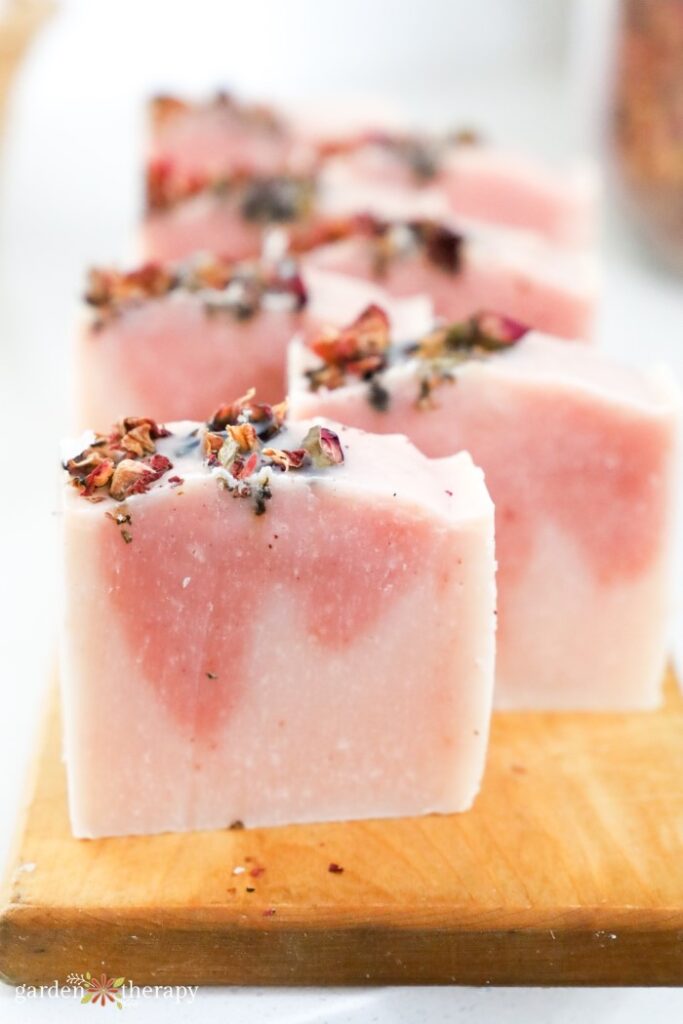
Natural Soap Making Supplies for Cold Process Soap
When it comes to soap making, you do need to acquire quite a few supplies upfront. Then, you slowly accumulate more oils, scents, colours, and other fun stuff to make some truly beautiful custom soaps. Here are all the things you need for making soap and the ones I personally use.
Equipment
The core of your soap making supplies will be the equipment you use every time you make your soap. Alongside every soap recipe I make, these are the materials I pull out and use every single time.
- Kitchen scale
- Infrared thermometer
- Soap-making pitcher
- Stainless steel double boiler or Turkish coffee pot
- Heatproof measuring cup
- Mixing bowl
- Immersion blender
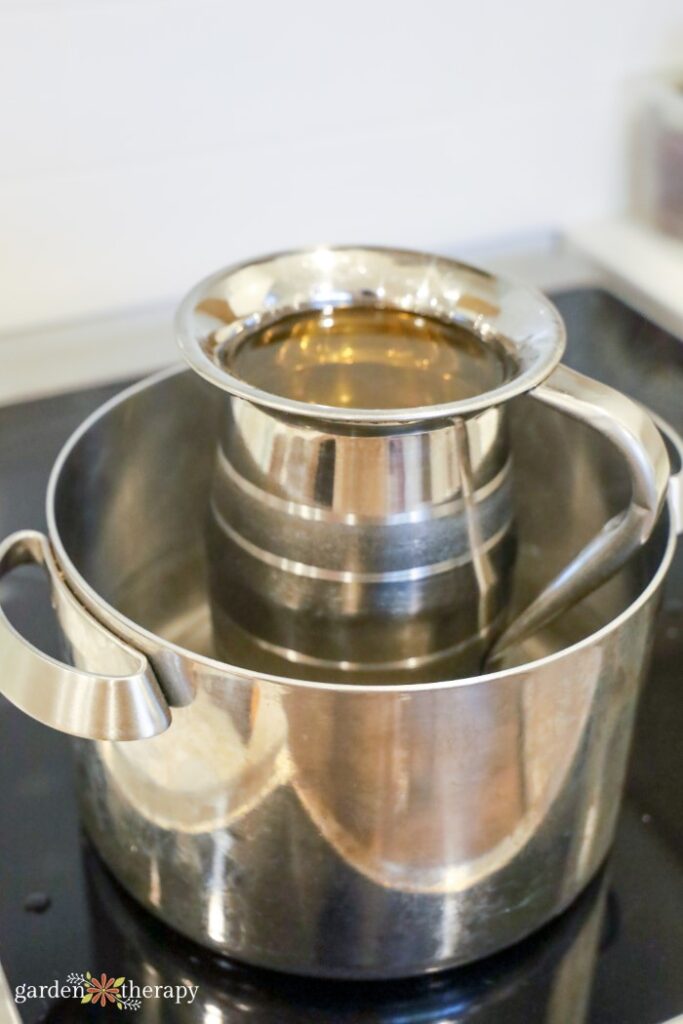
Safety Gear
Don’t even think about skimping out on your safety gear! When working with lye, you want to be extra careful as it can burn the skin before it goes through saponification and turns into soap.
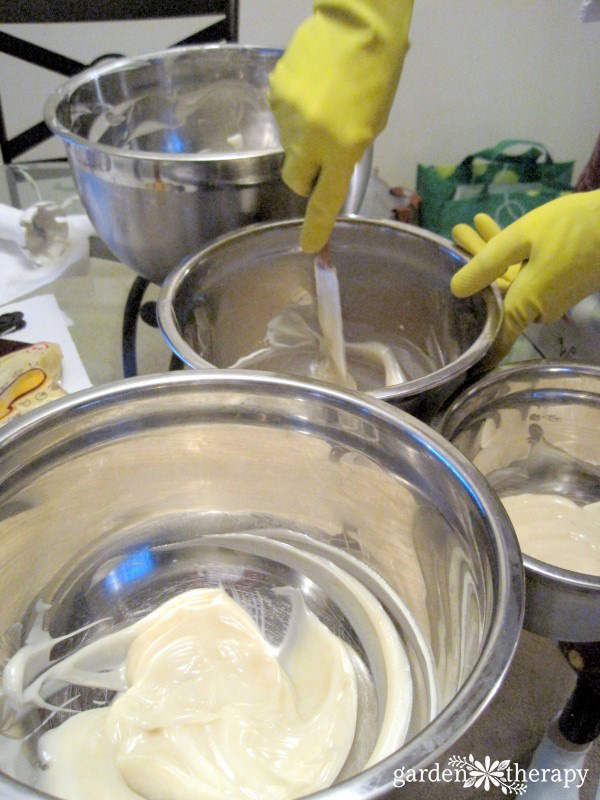
Soap Moulds
Soap moulds are where you can really get creative. Loaf soap moulds are the most traditional, where you pour it all in, then cut it into squares or rectangles once it has set.
Alternatively, you can find some really fun shapes to turn your soap into. Here are some of my favourite moulds, though there are so many out there in just about any shape. Just look for silicone ones for easy removal.
- 2 lb loaf soap mould
- 3 lb loaf soap mould
- Cupcake mould
- Oval moulds (as used in my chamomile soap recipe)
- Square moulds
- Rose mould
- Sleeping woman mould (as used in my lard soap recipe)
- Flower moulds
- Ice cube moulds (for hand soaps!)
Want a DIY soap mould for your first one? Use a milk carton and cut off the top. Once you’re ready to take the soap out, just tear away the milk carton.
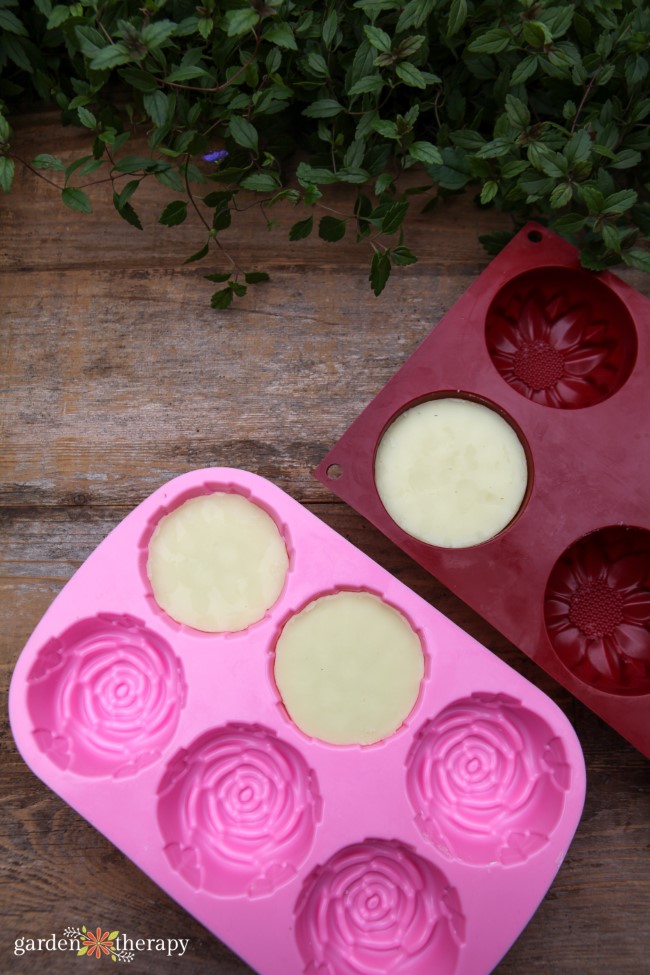
Oils, Butters, and Fats
Oils and butters will compromise the base of your recipe. You can mix many of these oils together, and I really suggest you do so to get the perfect lather, clean, and moisturizing properties you’re looking for. Now, there are SO many you can use, but these are my go-to cold process soap making supplies.
- Castor oil
- Coconut oil
- Grapeseed oil
- Jojoba oil
- Extra virgin olive oil
- Sweet almond oil
- Wheat germ oil
- Safflower oil
- Sunflower oil
- Cocoa butter
- Shea butter
- Mango butter
- Rice bran oil
- Lard
For most of my soap recipes, I infuse beneficial plants like calendula, chamomile, rose, lavender, and more. You can see how I infuse my oils following these instructions.
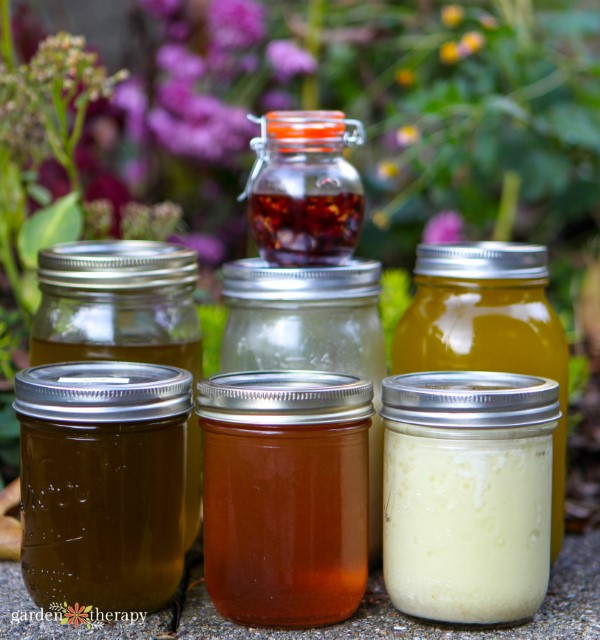
Lye
You can’t have cold process soap without lye. Luckily, this ingredient is pretty straightforward. If you want to read more about what lye is and how to use it properly, I encourage you to read this post. Otherwise, you will just need lye (also known as sodium hydroxide) mixed with water (ideally distilled).
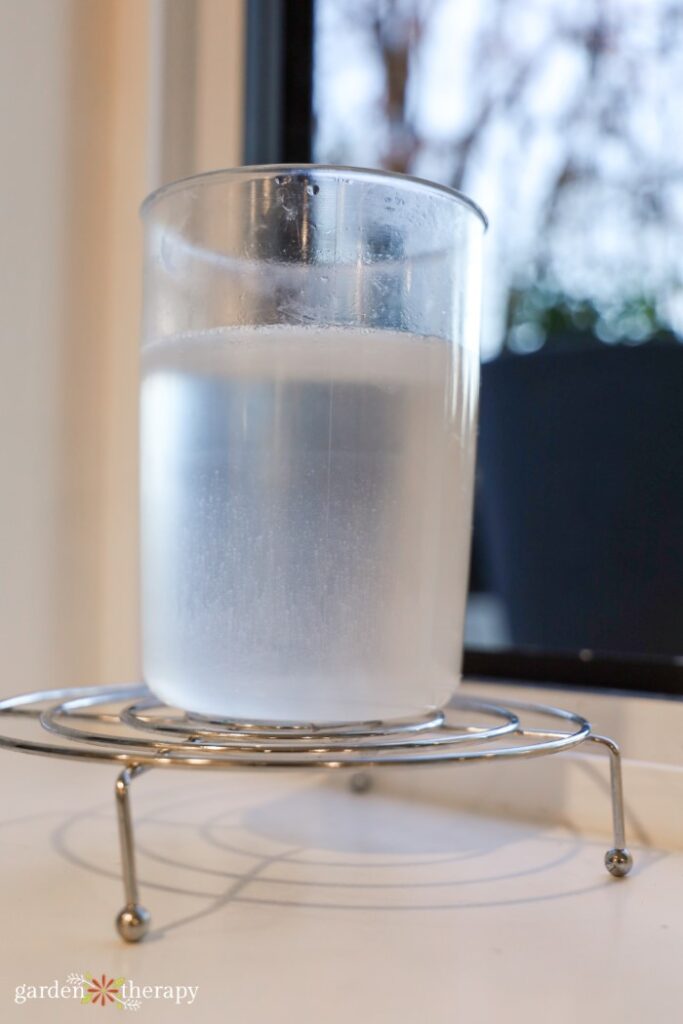
Essential Oils
Combining scents and making your own custom perfume blend is one of the best parts about making your own soap. While you can buy fragrance for soaps, I always use essential oils as they’re natural and very effective. Also, you can easily go for an unscented soap as well if you have a sensitive nose.
- Cedarwood
- Cypress
- Sweet birch
- Grapefruit
- Tangerine
- Bergamot
- Lavender
- Cinnamon leaf
- Sweet orange
- Vanilla absolute
- Geranium
- Heartsong blend
- Peppermint
- Basil
- Black pepper
- Rosemary
- Lime
- Spearmint
- Lemongrass
- Lemon
- Eucalyptus
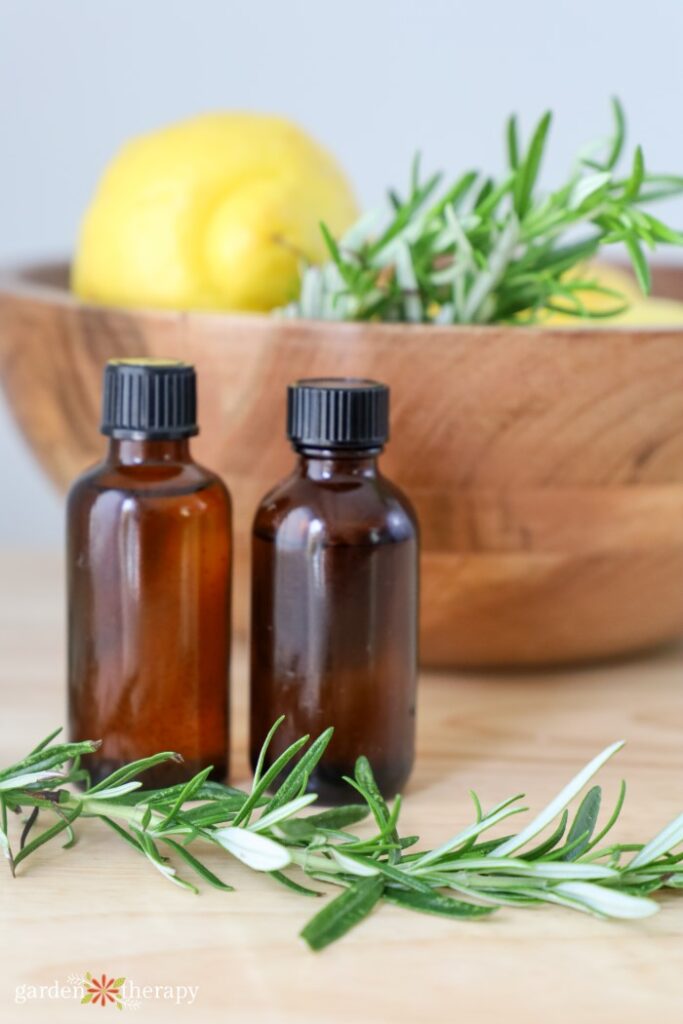
Colourants
Another way to display your artistry when making soaps is the colours you decide to you. You can layer different colours for an ombre effect or make swirls in your soap where every piece turns out differently.
Once again, you can buy artificial colourants, but these are the natural colourants I keep in my soap making supplies for cold process soaps.
- Spirulina powder (green, as I did with my winter forest recipe)
- Mica powders (my go-to natural and bright colourants)
- Oxides (another large assortment of colours)
- Turmeric (yellow/orange, as I did with this orange and cinnamon soap)
- Madder root powder (red/pink, as used in my rose soap recipe)
- Indigo powder (blue)
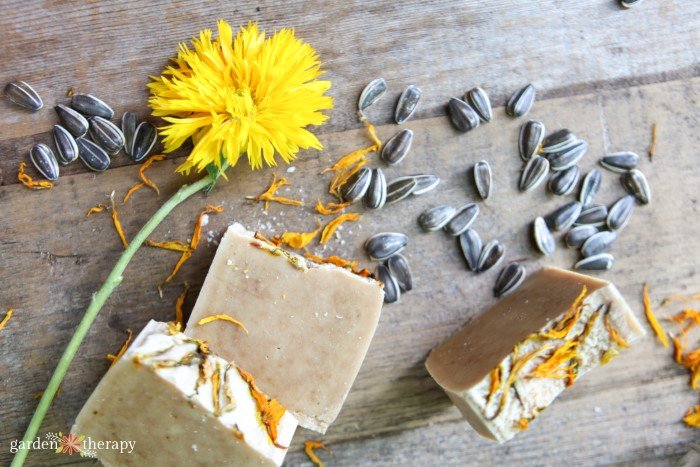
Decorations
Of course, decorations are optional. My preferred way to top off my soaps is using dried flower petals I saved from the garden. But there are some other fun ways to top them off as well! Adding decorations is a simple way to polish off your soap.
- Rubber embossing stamps
- Dried orange slices and other dried fruit
- Dried butterfly pea flower
- Dried cornflower
- Dried calendula
- Dried rose petals
- Dried lavender buds
- Dried echinacea petals
- Dried sunflower petals
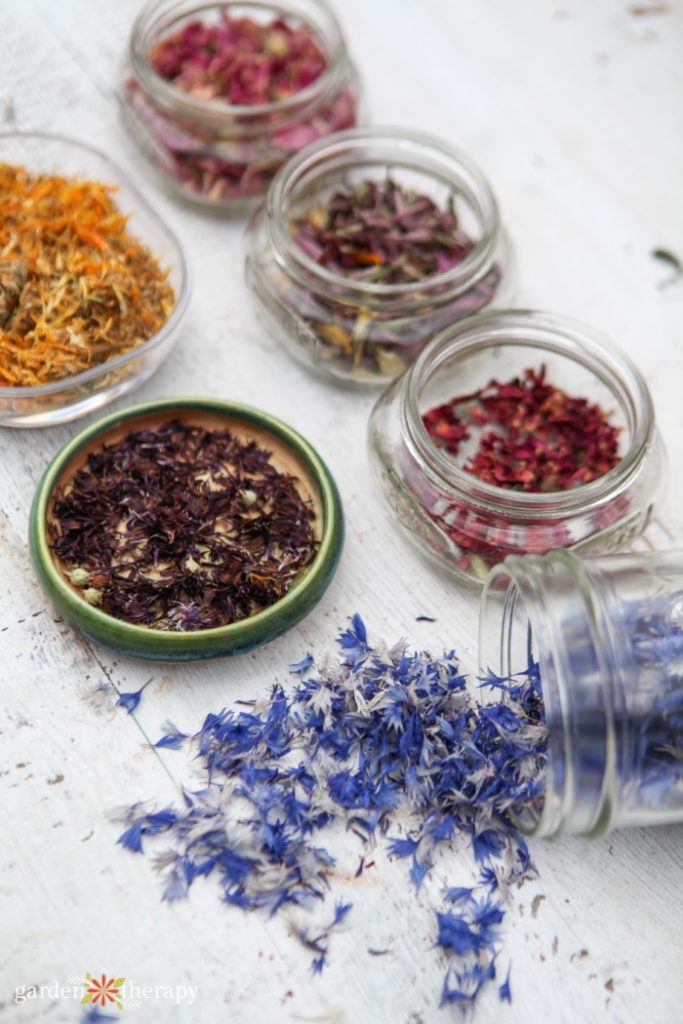
Extra Ingredients
Some soaps are extra special and call for some more ingredients. Here are some other soap making supplies I use occasionally and the soap recipes I created with them.
- Colloidal oats finely ground. This is amazing for the skin. I use it in my oatmeal soap recipe alongside rolled oats.
- Loofah. A completely natural exfoliant, you can also grow them yourself! See how I used them in my loofah soap recipe.
- Charcoal. An amazing ingredient for those with oil or acne-prone skin. Charcoal naturally draws out toxins to detoxify the skin. I use it in my charcoal soap recipe.
- Bentonite clay. Also really effective at removing toxins and treating oily skin. I use it in conjunction with charcoal.
- Matcha. I adore matcha, so I wanted to make a soap out of it! It ended up being a subtle green colourant.
- Earl Grey tea. Likewise, I used earl grey tea bags to infuse directly in my soap for my Earl Grey bergamot soap recipe.
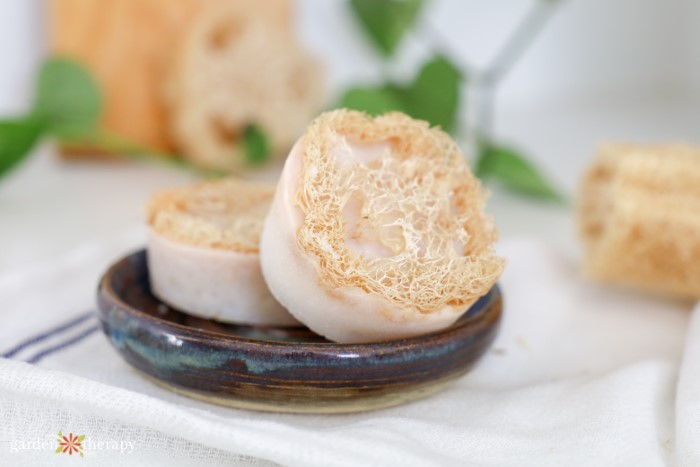
Frequently Asked Questions About Soap Making Supplies
If you live in a city, you might have a store designed especially for soap, candles, and beauty making. Other great places are refillable stores, as they often carry specialty oils, essential oils, and colourants that may be difficult to find elsewhere. Many homestead-style stores that sell things like gardening supplies, animal feed, and more will have sections for at-home soap makers as well.
You can always order your supplies online if you can’t find a hobbyist store.
For a beginner, the convenience of buying a soap making kit is great. It should have your mould, which you can use time and time again, as well as supplies like oils, lye, colourants, and scents. They may also come with a recipe for you to follow.
If you’ve made soap before and have some of the supplies, it’s probably a better deal to get refills of what you need rather than buying a new kit.
Loaf soap moulds are the go-to, as you can create one long block of soap that you then cut into traditional bars of soap. No matter the mould type, try to use a silicone mould, as it’s easier to get the soap out once it has been set.
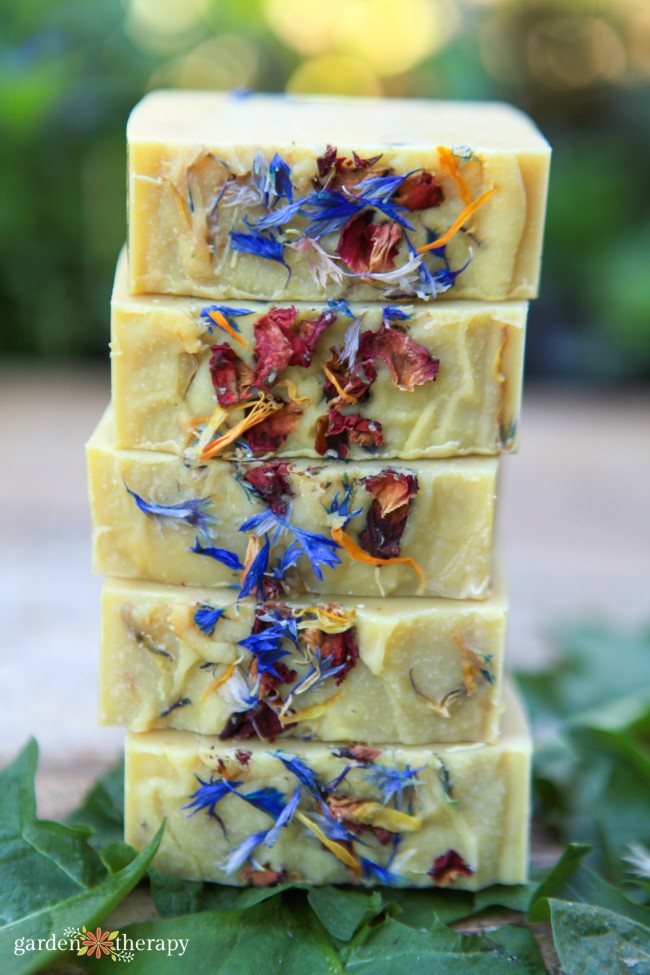
Got any more soap making questions? Leave them in the comments below, and I’ll reply as soon as possible.


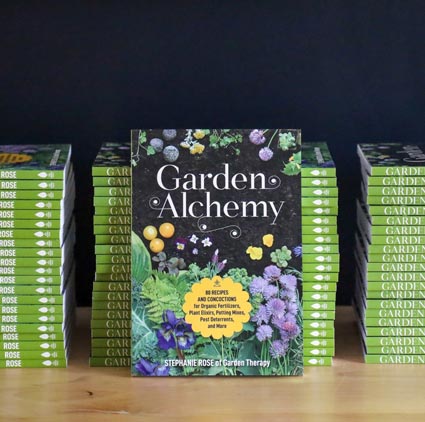
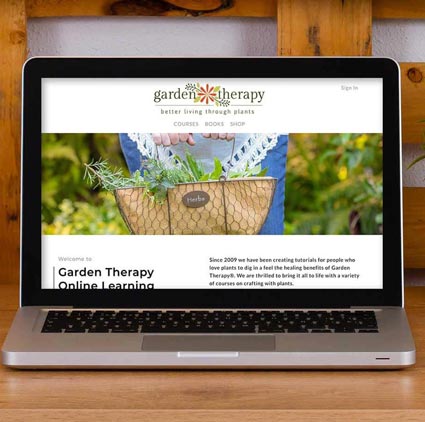

Hi 👋 I was wondering what I would need to make my own creamy hand soap
https://gardentherapy.ca/foaming-lime-and-rosemary-soap/